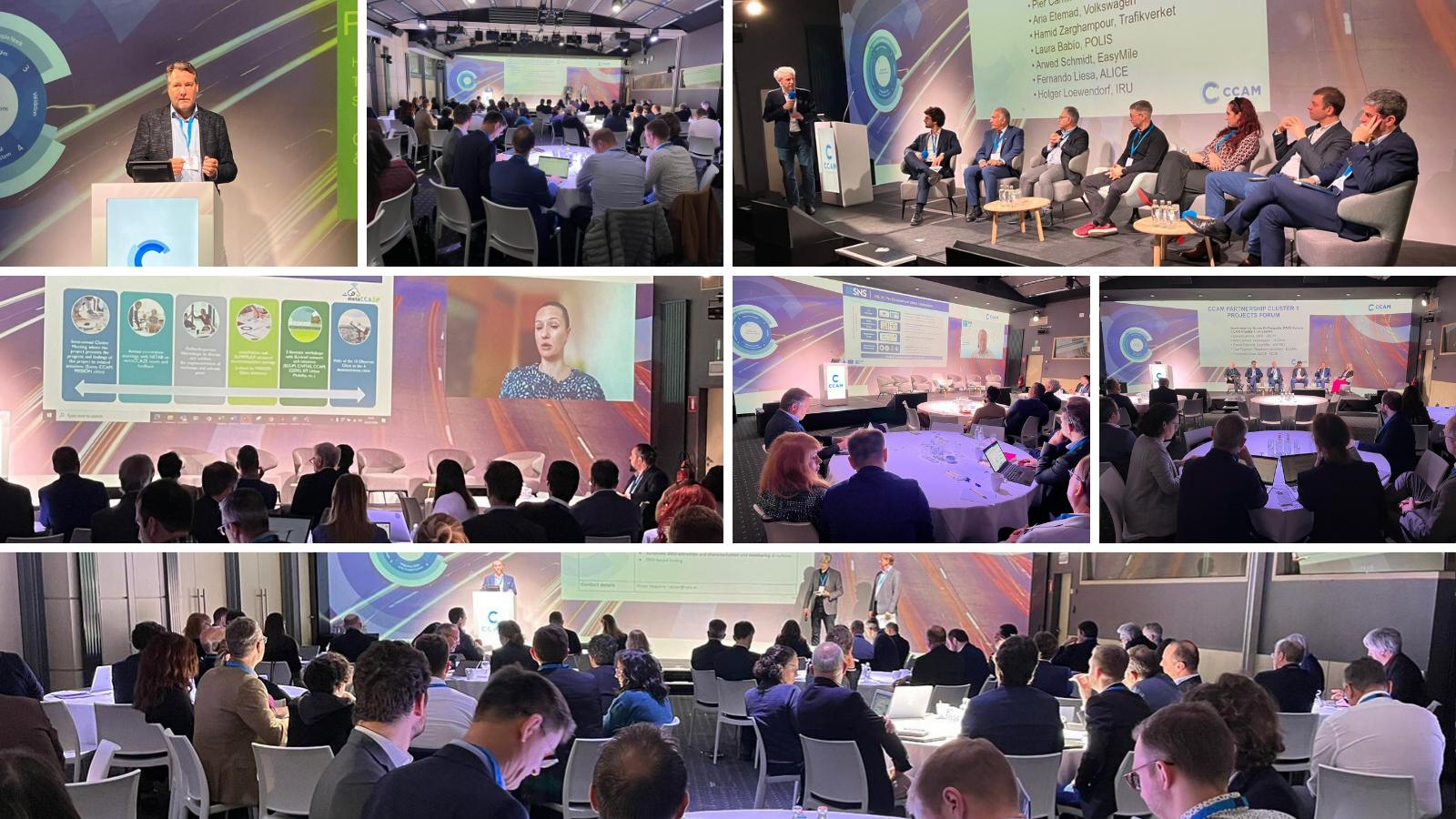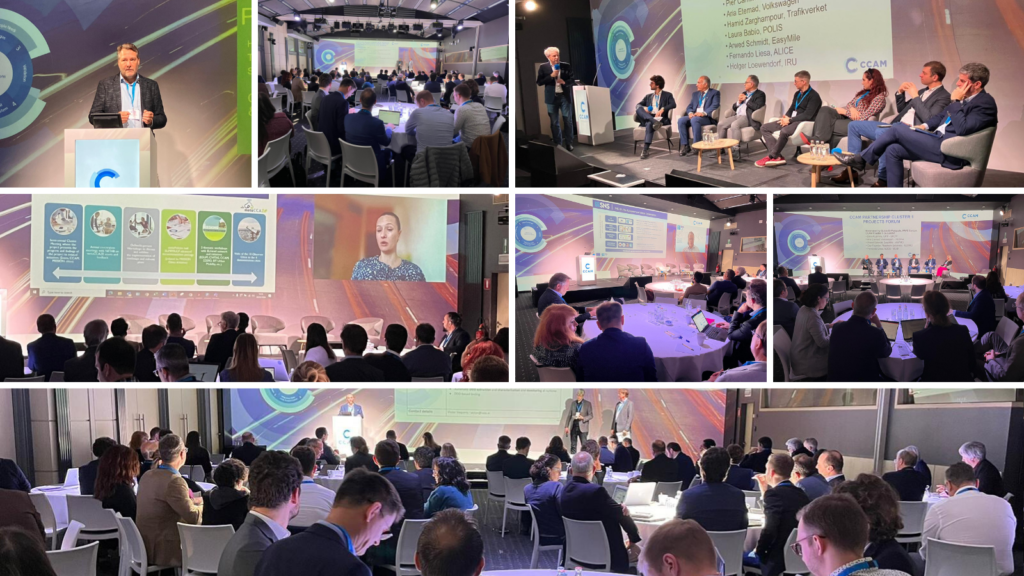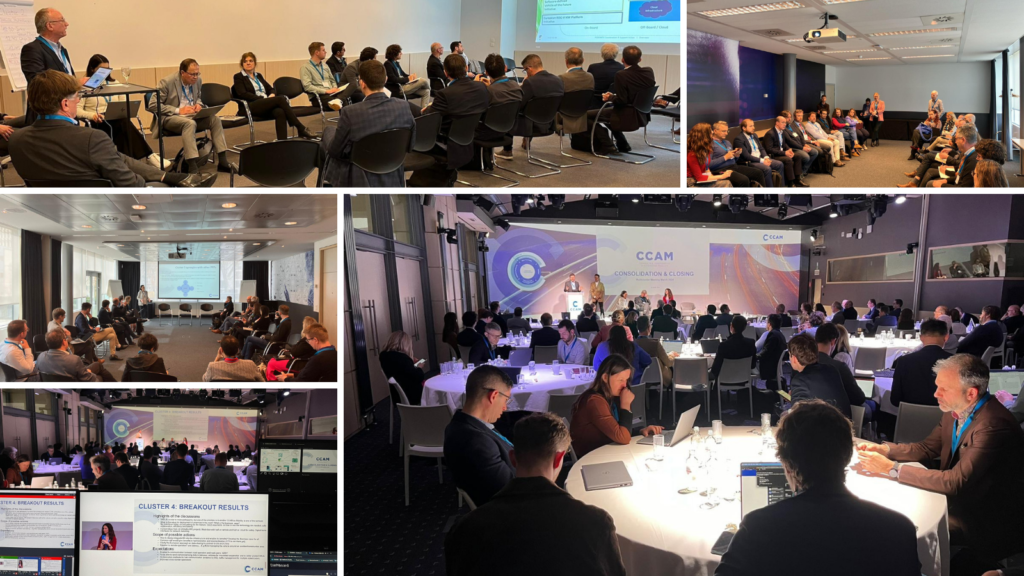Last modified on March 22, 2024

CCAM brokerage day and super-charged Multicluster meeting on 18-19 March 2024
On the 18 and 19 March 2024, members of the CCAM Association gathered in Brussels for a two-day meeting. The first day was a networking event, that focused on the CCAM Horizon Europe Work Programme for 2024 which will be open for project submissions from May to September this year. The second day held the CCAM Multicluster meeting, which focused on the preparation of future large-scale demonstration calls for projects and potential cooperation with other Horizon Europe partnerships.
During the networking event, the following topics were presented:
• Cluster 2 Vehicle technologies: HORIZON-CL5-2024-D6-01-01: Centralised, reliable, cyber-secure & upgradable in-vehicle electronic control architectures for CCAM connected to the cloud-edge continuum
• Cluster 3 Validation: HORIZON-CL5-2024-D6-01-02: Scenario-based safety assurance of CCAM and related HMI in a dynamically evolving transport system
• Cluster 4 Integrating CCAM in the transport system: HORIZON-CL5-2024-D6-01-03: Orchestration of heterogeneous actors in mixed traffic within the CCAM ecosystem
• Cluster 5 Key Enabling Technologies: HORIZON-CL5-2024-D6-01-04: AI for advanced and collective perception and decision-making for CCAM applications
• Cluster 7 Coordination: HORIZON-CL5-2024-D6-01-05: Robust Knowledge and Know-How transfer for Key-Deployment Pathways and implementation of the EU-CEM.
On the following day, our chairman, Armin Grater provided an update on the current status of the CCAM Partnership, including the ongoing research projects, like the two recently started Cities Mission projects. He also discussed the outlook for the Work Programmes 2025, 2026 and 2027, with a specific focus on large-scale demonstrations in CCAM Cluster 1.
Additionally, Armin provided an overview of the Partnership’s (potential) collaboration with other Horizon Europe Partnerships.

Guido Di Pasquale, a representative of PAVE Europe and CCAM Cluster 1 Co-Leader, moderated an informative session on the first demonstration results of various projects, including SHOW, Hi-Drive, AWARD, ULTIMO, and MODI. Each project provided updates on their progress and highlighted the challenges they faced, such as obtaining authorisation for real-life testing (MODI) and dealing with bankrupt partners (ULTIMO). Finally, the 2 Cities Mission projects, metaCCAZE and Mobilities for EU, presented more details about their plans and objectives.
During the 2nd session, moderated by Mats Rosenquist from Volvo Group who is also CCAM Cluster 1 Leader, Pier Camillo Carrescia (Autostrade per l’Italia), Laura Babio (POLIS), Fernando Liesa (ALICE), Aria Etemad (Volkswagen), Arwed Schmidt (EasyMile), Holger Loewendorf (IRU) and the CCAM vice chairman, Hamid Zarghampour (Trafikverket) participated in a lively debate on CCAM use cases. Each of the panellists shared their unique perspectives on highway and urban mobility. Hamid emphasised the importance of all CCAM services and applications functioning simultaneously “while the plane is flying”, which is a challenging task. Aria highlighted that the CCAM Partnership should not only focus on a sectorial perspective but should also adopt a system approach.
Before the breakout sessions took place, a final session was conducted to provide insights on some topics related to enabling technologies. These topics were then discussed in detail in the following breakout sessions:
– CCAM Cluster 2 & Photonics21 & Chips JU (previously known as KDT)
– CCAM Cluster 4 & Smart Networks and Services
– CCAM Cluster 5 & AI, Data, and Robotics
The results from the breakouts are presented in succession:
Cluster 2 has identified several shared interests and areas for collaboration with Chips Joint Undertaking and Photonics21 Partnership. The collaboration needs to be a two-way street, with both parties contributing towards development and large-scale deployment. Photonics21 requires endorsement and would enjoy more benefits from collaborating with Cluster 1 than Cluster 2. The collaboration with Chips JU, on the other hand, requires an acute need for framing the collaboration for the next WP, especially in the interaction between software and hardware. The need for more collaboration on energy efficiency and consumption of CCAM technologies in the future requires a crucial synchronised development, and the CCAM Partnership can take the lead in establishing more collaboration to facilitate these developments.
Cluster 4 discussed telecom technologies and the evolution of 6G. The Envelope project was discussed, and there was a good conversation about how 5G and the future 6G can support CCAM technology. There was also a new and insightful discussion on standardisation. Greater collaboration is strongly needed to ensure that we get the right standardisation and regulation to support CCAM technologies. The group also discussed how 6G can support critical scenarios and safety interventions from outside environments to make decisions and instruct interventions. The group also talked about cross-border cooperation and potentially using this application for VURs, having the technology to support the safety message to V2V or V2Infrastructure. The conclusion was that there is a need for more work on harmonisation, while there is an opportunity for growth as the technology is still in its infancy.
Cluster 5 looked for ways and synergies to collaborate with the AI, Data and Robotics Partnership. The inclusion of technologies developed out there on the CCAM stacks will have an impact on different CCAM clusters’ work. Integrating these technologies is not a simple task. The scope of possible actions includes technical development models that need to be specific for sectors, requiring a more collaborative and use-case approach to allow transferability.

Stephan Dreher (ERTICO), CCAM Cluster 7 Leader, provided information on EUCAD and the FAME project. The EUCAD symposium will take place in conjunction with TRA on the last two days of the week of 15 April 2024 in Dublin. The EUCAD conference will take place in ISPRA at JRC (Italy) in 2025. He reiterated that projects should consider presenting their demonstrations (as part of project demonstrations) in Ispra, or at least submit for an information stand to disseminate the content of their work. It is necessary to exchange knowledge, which is the aim of the FAME project. FAME seeks and gathers information from other projects, asking about methodology and results, to build a knowledge base.
Andrea de Candido gave the final words of the Multicluster Meeting from DG RTD of the European Commission. Andrea thanked the members for their continuous interest in the CCAM calls for projects. He stressed, it showed that the topic is very much alive. Andrea then touched upon large-scale demonstrations and synergies. With regards to demonstrations, the building blocks of what has been done so far have to be put together and done so through Work Programmes. The demonstrations can then be deployed, using specific use cases to get close to market deployment. What needs to be ensured is a balance between two dimensions: achieving concrete objectives and being ambitious.
Synergies with other partnerships require a big effort to bring together different stakeholders with varying objectives. Finding common ground is essential for the added value of this Partnership. The community has the capacity to aggregate and ensure that there are no duplications of work, optimising work progress and limited budgets. Good examples are the joint calls with 2ZERO and the collaboration with Chips-JU to find ways to complement each other.
This article was originally published on CCAM. The original blog post can be found here.


